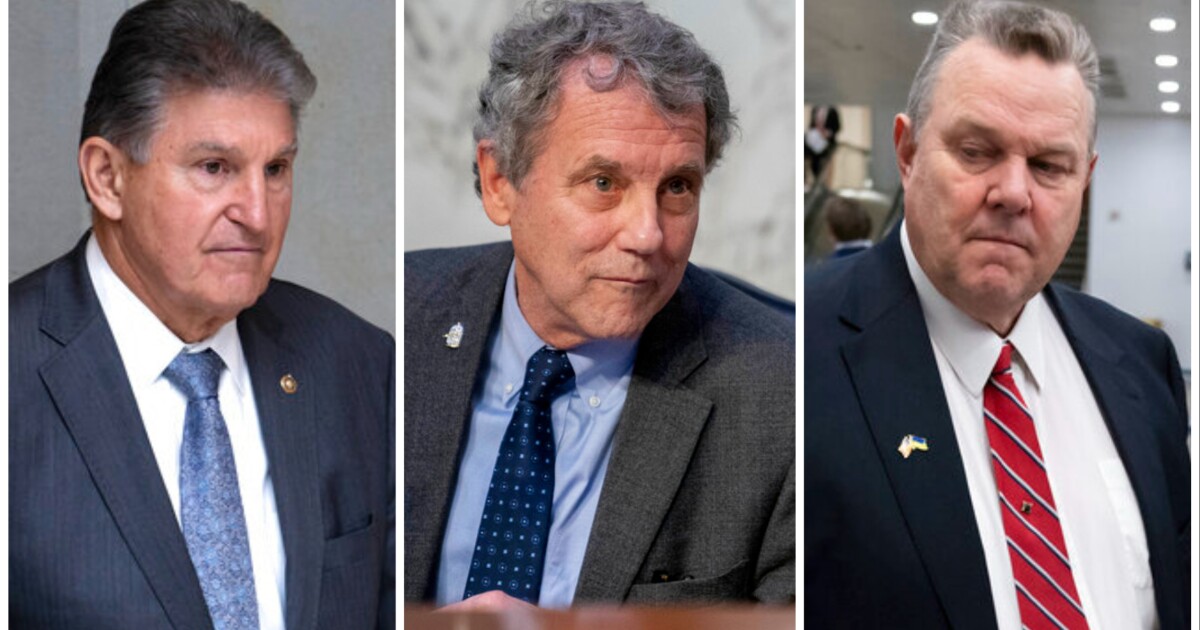

Even in a divided Congress, Republicans have found a way to play offense against vulnerable Senate Democrats and moved legislation in a chamber they don’t control by forcing politically sensitive votes that drive a wedge between senators up for reelection in red states and the Democratic base.
At least four times in the last month, Republicans scored wins and divided Democrats by deploying a congressional maneuver called a resolution of disapproval to target policies they oppose and force Democrats to either embrace President Joe Biden’s positions or buck their party. The procedural tool has forced Biden to confront bills he opposes, which is somewhat unusual when his party controls the upper chamber since the majority leader often can prevent controversial legislation from being voted on, sparing the president from having to veto a bill or make a politically charged decision to sign it instead.
SENATE VOTES TO END COVID-19 PUBLIC HEALTH EMERGENCY AFTER BIDEN SIGNALS HE WON’T VETO
The resolution of disapproval can’t be kept off the floor by the majority leader and cannot be filibustered, allowing lawmakers to rescind recently finalized rules with a simple majority vote in both chambers and the signature of the president.
All eyes are on Sens. Joe Manchin (D-WV) and Jon Tester (D-MT), the only Senate Democrats up for reelection in states former President Donald Trump won by double digits in 2020, and Sen. Sherrod Brown (D-OH), a third vulnerable Trump-state Democrat. Republicans are also hoping these votes put a spotlight on swing state senators like Kyrsten Sinema (I-AZ) and Jacky Rosen (D-NV). So far, only Tester, Brown, and Rosen have confirmed they will be running for reelection in 2024.
A vote to end COVID-19 public emergency
The Senate approved a resolution 68-23 last Wednesday to end the COVID-19 public health emergency crisis. A large number of Democrats voted with Republicans in support of the resolution after Biden gave vulnerable Democrats political cover and indicated he will sign legislation to lift the national emergency declaration. The move came less than two months after House Democrats opposed the same measure in droves at the administration’s request.
The vote was largely symbolic since the administration had already said the emergency declaration would be allowed to expire in May, but the measure could speed up the process.
Manchin, Tester, Brown, Sinema, and Rosen voted with several of their other Democratic colleagues and all Republicans in support of the measure.
A vote to roll back Clean Water Rule
The Senate also approved another measure last week to cancel a key Biden administration rule that defines what bodies of water are subject to federal regulation under the Clean Water Act.
Senators voted 53-43 to overturn the rule, sending the bill to the president’s desk, where he is expected to veto it.
Manchin, Tester, Rosen, and Sinema split with Democrats on the clean water vote, voting in support of the resolution to cancel the Biden rule. Brown voted with the Democrats.
SENATE MOVES TO ROLL BACK CLEAN WATER RULE, SETTING UP SECOND BIDEN VETO
A vote to block a new criminal code for the District of Columbia
Earlier in the month, Senators voted overwhelmingly to block the District of Columbia’s updated criminal code from becoming law, which would have reduced or eliminated mandatory minimum sentences for carjacking and some other violent crimes. The vote exposed deep divisions within the party over how to confront concerns over crime and public safety. Before the Senate vote, 173 House Democrats voted with what they thought was the White House stance that Biden would veto the resolution in an effort to stand up for the district’s “home rule.”
Biden reversed his position during a lunch with Senate Democrats, telling them he would sign the resolution, angering lawmakers across the Capitol complex who had already voted against it. Biden and Senate Democrats up for reelection are under increasing pressure on the issue from Republicans, who have made reducing crime a major part of their agenda.
The measure cleared the Senate 81-14, with many Democrats voting with Republicans to approve it. Brown, Manchin, Tester, Rosen, and Sinema voted in support of it, and Biden signed the measure.
A vote to overturn federal rule on ESG investments
With some support from Democrats, the Senate voted to overturn a Labor Department rule that permits fiduciary retirement fund managers to consider environmental, social, and corporate governance, or ESG, factors in their investment decisions. Biden issued the first veto of his presidency on the measure.
Manchin and Tester were the only two Democrats who voted to overturn the rule. Brown, Rosen, and Sinema voted with most Democrats against it.
Nominations
The Biden administration has recently been struggling to get nominees confirmed despite having a Senate majority. The politically polarizing environment ahead of the 2024 election cycle, in addition to Democrats’ narrow majority in the Senate, put Biden’s picks under increased pressure.
CLICK HERE TO READ MORE FROM THE WASHINGTON EXAMINER
Phillip Washington, Biden’s pick to lead the Federal Aviation Administration, recently withdrew his nomination amid criticism he doesn’t have aviation credentials. In addition to fierce Republican opposition, Sinema and Tester had openly opposed Washington’s nomination, leading to his withdrawal. Earlier in the month, Gigi Sohn, Biden’s pick to serve as the top telecommunications regulator for the Federal Communication Commission, withdrew her nomination after months of controversy. Manchin opposed her nomination.
It remains unclear if the group of centrist Democrats will support Julie Su, Biden’s pick to replace former Labor Secretary Marty Walsh. Su was narrowly confirmed to serve as deputy labor secretary in 2021 by only a three-vote margin. While she did receive the support of Manchin, Tester, and Sinema back then, many red state Democrats have not revealed whether they will support her nomination at this time.





